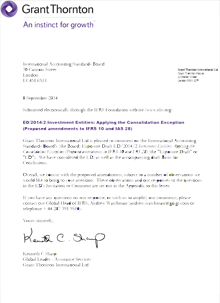Currently IAS 27 requires an entity to account for its investments in subsidiaries, joint ventures and associates either at cost or in accordance with IFRS 9 ‘Financial Instruments’ (or IAS 39 ‘Financial Instruments: Recognition and Measurement’ where an entity has not yet adopted IFRS 9).
In responses to the IASB’s 2011 Agenda Consultation, some of the IASB’s constituents noted however that:
- the laws of some countries require listed companies to present separate financial statements prepared in accordance with local regulations
- those local regulations require the use of the equity method to account for investments in subsidiaries, joint ventures and associates
- in most cases, the use of the equity method would be the only difference between the separate financial statements prepared in accordance with IFRSs and those prepared in accordance with local regulations.
As a result the Exposure Draft (ED/2013/10) proposes introducing a third option which would allow entities to account for investments in subsidiaries, joint ventures and associates under the equity method. Entities would then have an accounting policy choice in their separate financial statements between accounting:
- at cost
- in accordance with IFRS 9 (or IAS 39)
- under the equity method.
Entities would be required to apply the same accounting for each category of investments. It is proposed that entities would be required to apply the proposed amendments retrospectively. No transitional provisions are considered necessary as the IASB believes entities should be able to use information that is already available to them in applying the proposals.
In our letter, we support the inclusion of the equity method as one of the options to account for an entity’s investments in subsidiaries, joint ventures and associates in the entity’s separate financial statements.
While we acknowledge that there are some concerns with the amendments, we recognise that reinstating this option will reduce the burdens on entities in jurisdictions that require the preparation of separate financial statements and the use of the equity method in those statements. We therefore support the proposals, mainly on pragmatic grounds.


